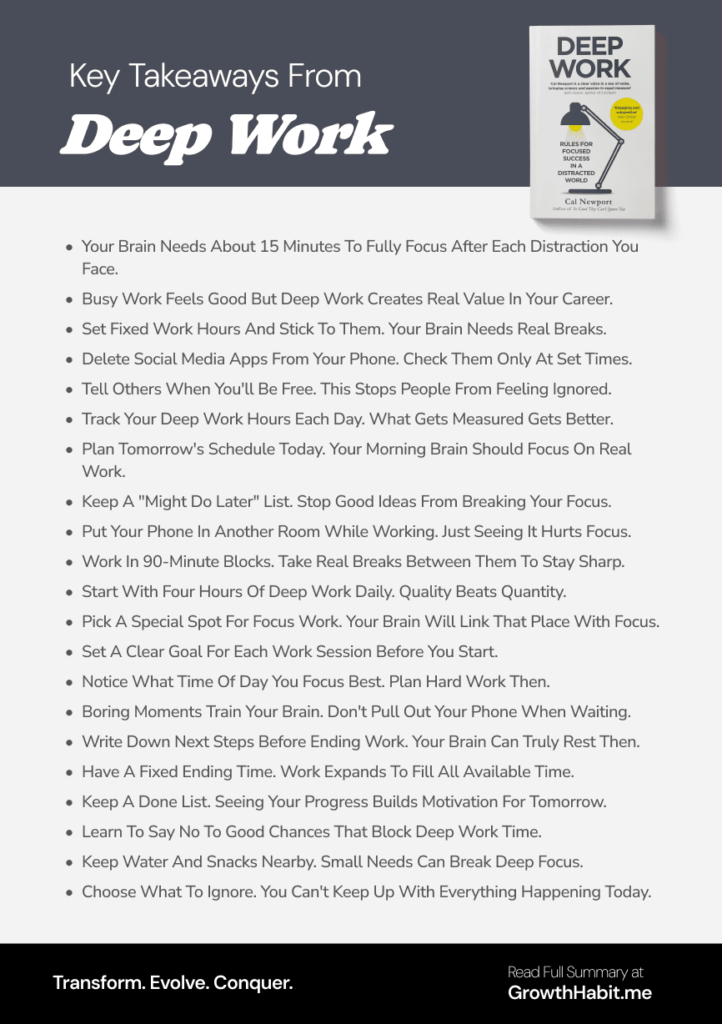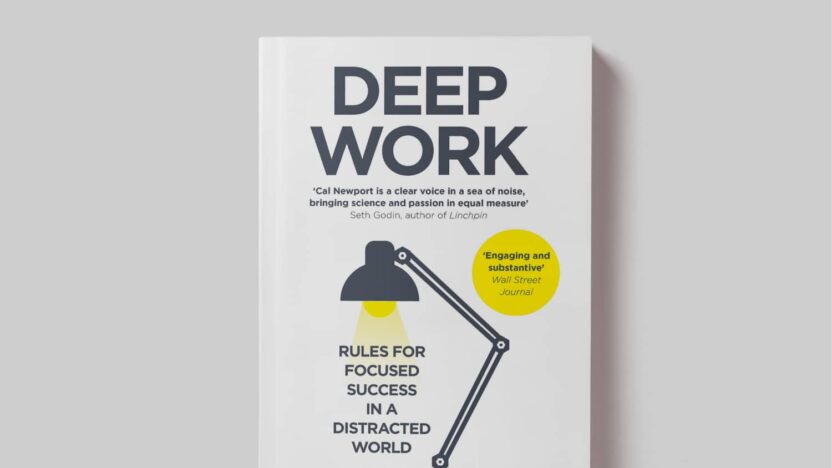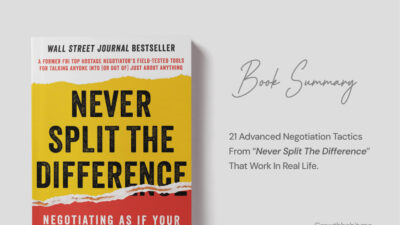Focus is becoming a rare skill in today’s busy world. Our phones buzz all day. Apps want our attention. Email never stops. This flood of distractions makes it hard to get real work done. But some people have found a better way to work.
In his book Deep Work, Cal Newport shows us how to cut through the noise and focus on what matters. The best workers in every job – from artists to leaders – know how to focus deeply on hard tasks. They get more done in less time. Their work stands out. And they often feel less stressed.
The best part? These focus techniques aren’t secret or special. Anyone can learn them. In this guide, we’ll explore 16 simple ways to boost your productivity and do better work. These tips work for everyone – from students to professionals. They’ll help you think more clearly, learn faster, and create work you’re proud of.
16 simple ways to boost your focus and get more work done.
1. Set Focus Time Blocks
Pick the time of day when you feel most alert. Block out 2-4 hours just for focus work. Put it on your calendar. Turn off your phone. Find a quiet spot. Treat this time like it’s your most important meeting of the day. Most people do their best work in the morning. Try starting with a two-hour focus block right after breakfast. Your mind is fresh then.
2. Make Your Workspace Clean and Simple
Your desk matters more than you think. Keep it neat and tidy. Put away your phone. Close extra tabs on your computer. The less stuff you see, the better you can focus. A clean desk helps your mind stay clear too. Try the “one in, one out” rule. Each time you add something to your desk, take something away. This keeps your space from getting messy.
3. Work in 90-Minute Chunks
Your brain works best in cycles. Try to focus for 90 minutes, then take a 15-minute break. This matches how your body naturally works. It helps you stay fresh and sharp. Do just one thing during each focus time. Don’t try to do many things at once. Think of it like running – you need rest between sprints. Your brain works the same way. A timer can help you stick to this pattern.
4. Start With Four Hours
Begin with four hours of focus work each day. Split it into two chunks. This might not seem like much, but good focus work is hard! It’s better to do less time with full focus than more time with poor focus. You can add more time as you get better at it. Think of it like going to the gym. You start with lighter weights before lifting heavy ones. Many top workers only do four hours of deep work daily. That’s enough to get big things done.
5. End Your Day Right
Create a simple end-of-day routine. Look at what you got done. Plan for tomorrow. Then stop thinking about work. This helps your brain rest and reset. You’ll come back fresh the next day. Write down three things you want to do tomorrow. Put away all your work stuff. Close your laptop. Think of it as shutting down a computer – your brain needs a full stop too.
6. Keep Track of Focus Time
Write down how long you focus each day. Use a simple notebook or spreadsheet. This helps you see how you’re doing. You’ll spot what helps you focus better. You don’t need fancy apps – just keep it simple. Look back each week to see your progress. Give yourself a small reward when you hit your focus goals. Even a star on your chart can make you feel good.
7. Break Big Jobs Into Small Steps
Big projects can feel scary. Break them into tiny tasks. Each task should take 30-60 minutes. This makes it easier to start. You’ll feel good as you check off each small task. Use a simple list to track each step. Cross them off as you go. It’s like eating a sandwich – you take one bite at a time. Small wins add up to big progress. Your mind feels calmer when you work this way.
8. Learn to Be Bored
When you’re waiting in line, don’t grab your phone. Let yourself feel bored sometimes. This trains your brain to be okay without constant fun stuff. It helps you focus better when you need to. Start with just five minutes of quiet time. Build up slowly each day. Notice the world around you instead. Listen to birds. Watch clouds. These quiet moments make your mind stronger. Soon, being bored won’t feel so bad.
9. Set Clear Work Times
Make simple rules about when you’ll use tech. Maybe no email after dinner. Or no social media before lunch. This keeps work from taking over your whole day. It saves your energy for when you need to focus. Tell your friends and family about your rules. They can help you stick to them. Write your rules on a note by your desk. Having clear stops and starts makes work better. Your free time feels more fun too.
10. Plan the Where and When
Don’t just say “I’ll do this work.” Say “I’ll do this work at my desk from 9 to 11 AM.” When you plan the exact time and place, you’re more likely to do it. Pick spots that work well for you. Some like quiet rooms. Others like busy cafes. Try different places to find your best spot. Keep a list of good places to work. Switch spots if you start feeling stuck. A change of scene can help your brain work better.
11. Create a Focus Routine
Make a simple routine that tells your brain it’s time to focus. Maybe make coffee, clear your desk, put on headphones, and check your task list. Do this every time. Your brain will learn that these steps mean it’s focus time. Keep the steps the same each day. It’s like how athletes warm up before a game. Your mind needs a warm-up too. Soon, just starting your routine will help you focus. Many top workers swear by their start-up habits.
12. Match Tasks to Your Energy
Do hard work when you feel most alert. Save easy stuff like email for when you’re tired. This helps you use your best energy for your most important work. Keep track of when you feel most awake. Most folks feel sharp in the morning. Others work best late at night. Know your peak times. Plan your day around them. Match big tasks to high energy. Save small jobs for low energy times. Your work gets better when you time it right.
13. Make Fewer Choices
Save your brain power for important stuff. Wear similar clothes each day. Eat simple meals. Make routines for small tasks. The less you think about little things, the more energy you have for big things. Pick your clothes the night before. Plan your meals for the week. Set up auto-pay for your bills. Each small choice takes a bit of energy. Save that energy for work that matters. Many successful people keep their daily choices simple.
14. Take Good Breaks
Your brain needs rest, just like your body. Take walks in nature. Try some quiet breathing. Do light exercise. These help your mind feel fresh again. They work better than watching videos or playing games. Stand up every hour to move around. Look at far-away things to rest your eyes. Drink water during breaks. Good breaks make your focus time better. Think of breaks as part of your work, not time off from it.
15. Build Your Focus Muscle
Think of focus like a muscle. Start with short focus times. Slowly make them longer. When your mind wanders, gently bring it back. It’s like training a puppy – be patient and keep trying. Set a timer for just 15 minutes at first. Add five minutes each week. Don’t get mad when you get distracted. Just start again. Your focus will get stronger over time. Many people see big changes in just a month.
16. Look at What You Finish
Don’t worry about how many hours you work. Look at what you get done instead. Set clear goals for each focus session. Check if you met them. This tells you more than just counting hours. Write down your main task for each session. Check it off when it’s done. Share your wins with a friend. Seeing finished work feels good. It helps you want to do more. Success builds on success.
Main Tips to Remember

- Start small with your focus time
- Keep your workspace clean
- Make clear rules about work time
- Write down your progress
- Take good breaks
- Stick to simple routines
Conclusion
In this Deep Work book summary, we learned that the ability to concentrate deeply is one of the most valuable skills you can develop in today’s distraction filled world. As Cal Newport shows us in Deep Work, the ability to focus intensely sets top performers apart. But remember – everyone’s journey to mastering focused work looks different.
Start with just one or two of these productivity tips this week. Maybe try the morning focus blocks or set up a clean workspace. Pick the ideas that feel right for you. Small steps lead to big changes in how you work.
Many people who use these focus techniques find they get more done in less time. They feel less stressed. Their work gets better. Some even find more free time to enjoy life!
Remember – building your concentration skills is like training for a race. Start slow, keep steady, and celebrate your wins along the way. Your ability to focus deeply will grow stronger each day you practice.


